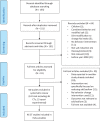Reducing salt intake: a systematic review and meta-analysis of behavior change interventions in adults
- PMID: 34921314
- PMCID: PMC8907486
- DOI: 10.1093/nutrit/nuab110
Reducing salt intake: a systematic review and meta-analysis of behavior change interventions in adults
Abstract
Context: Prolonged high salt (sodium) intake can increase the risk of hypertension and cardiovascular disease. Behavioral interventions may help reduce sodium intake at the population level.
Objective: The effectiveness of behavior change interventions to reduce sodium intake in adults was investigated in this systematic review and meta-analysis.
Data source: The PubMed, Cochrane Library, Cumulative Index to Nursing and Allied Health Literature, and EMBASE databases were searched.
Data extraction: Narrative synthesis and random-effects meta-analyses were used to determine intervention efficacy. A total of 61 trials (46 controlled trials and 15 quasi-experimental studies) were included.
Results: Behavior change interventions resulted in significant improvements in salt consumption behavior (eg, decrease in purchase of salty foods; increase in use of salt substitutes), leading to reductions in sodium intake as measured by urinary sodium in 32 trials (N = 7840 participants; mean difference, -486.19 mg/d [95%CI, -669.44 to -302.95]; P < 0.001; I2 = 92%) and dietary sodium in 19 trials (N = 3750 participants; mean difference -399.86 mg/d [95%CI, -581.51 to -218.20]; P < 0.001; I2 = 96%), equivalent to a reduction of >1 g of salt intake daily. Effects were not significantly different based on baseline sodium intakes, blood pressure status, disease status, the use of behavior change theories, or the main method of intervention delivery (ie, online vs face-to-face).
Conclusion: Behavior change interventions are effective at improving salt consumption practices and appear to reduce salt intake by >1 g/d.
Systematic review registration: PROSPERO registration no. CRD42020185639.
Keywords: behavior modification; diet; hypertension; salt intake.
© The Author(s) 2021. Published by Oxford University Press on behalf of the International Life Sciences Institute.
Figures



Similar articles
-
Impact of Salt Intake on the Pathogenesis and Treatment of Hypertension.Adv Exp Med Biol. 2017;956:61-84. doi: 10.1007/5584_2016_147. Adv Exp Med Biol. 2017. PMID: 27757935 Review.
-
Lifestyle modifications to prevent and control hypertension. 5. Recommendations on dietary salt. Canadian Hypertension Society, Canadian Coalition for High Blood Pressure Prevention and Control, Laboratory Centre for Disease Control at Health Canada, Heart and Stroke Foundation of Canada.CMAJ. 1999 May 4;160(9 Suppl):S29-34. CMAJ. 1999. PMID: 10333851 Free PMC article.
-
Interventions That Successfully Reduced Adults Salt Intake-A Systematic Review.Nutrients. 2021 Dec 21;14(1):6. doi: 10.3390/nu14010006. Nutrients. 2021. PMID: 35010883 Free PMC article.
-
Protocol for the implementation and evaluation of a community-based behavior change intervention to reduce dietary salt intake in India.J Clin Hypertens (Greenwich). 2023 Feb;25(2):175-182. doi: 10.1111/jch.14628. Epub 2023 Jan 14. J Clin Hypertens (Greenwich). 2023. PMID: 36639981 Free PMC article.
-
Association of a Province-Wide Intervention With Salt Intake and Hypertension in Shandong Province, China, 2011-2016.JAMA Intern Med. 2020 Jun 1;180(6):877-886. doi: 10.1001/jamainternmed.2020.0904. JAMA Intern Med. 2020. PMID: 32338717 Free PMC article.
Cited by
-
Dietary Effects of Introducing Salt-Reduced Bread with and without Dietary Counselling-A Cluster Randomized Controlled Trial.Nutrients. 2022 Sep 17;14(18):3852. doi: 10.3390/nu14183852. Nutrients. 2022. PMID: 36145227 Free PMC article. Clinical Trial.
-
Dietary intakes of hypertensive patients in rural India: Secondary outcomes of a randomised, double-blind, controlled trial.Dialogues Health. 2023 Feb 3;2:100109. doi: 10.1016/j.dialog.2023.100109. eCollection 2023 Dec. Dialogues Health. 2023. PMID: 38515467 Free PMC article.
-
Formation and Implementation of Public Health Policy Toward Salt Reduction in Food Consumption.J Prim Care Community Health. 2023 Jan-Dec;14:21501319231180164. doi: 10.1177/21501319231180164. J Prim Care Community Health. 2023. PMID: 37306335 Free PMC article.
-
Dyadic Interventions for Promoting Healthy Diets in Patients With Cardiovascular Disease: A Systematic Review and Meta-Analysis.Nurs Health Sci. 2025 Sep;27(3):e70183. doi: 10.1111/nhs.70183. Nurs Health Sci. 2025. PMID: 40704437 Free PMC article. Review.
-
The association between sodium intake and coronary and carotid atherosclerosis in the general Swedish population.Eur Heart J Open. 2023 Mar 30;3(2):oead024. doi: 10.1093/ehjopen/oead024. eCollection 2023 Mar. Eur Heart J Open. 2023. PMID: 37006408 Free PMC article.
References
-
- Boon CS, Taylor CL, Henney JE. Strategies to Reduce Sodium Intake in the United States. Washington, DC: National Academies Press; 2010. - PubMed
-
- Powles J, Fahimi S, Micha R, et al.; on behalf of the Global Burden of Diseases Nutrition and Chronic Diseases Expert Group (NutriCoDE). Global, regional and national sodium intakes in 1990 and 2010: a systematic analysis of 24 h urinary sodium excretion and dietary surveys worldwide. BMJ Open. 2013;3:e003733. - PMC - PubMed
-
- World Health Organization. Salt reduction. 2020. Available at: https://www.who.int/news-room/fact-sheets/detail/salt-reduction. Accessed August 2020.
Publication types
MeSH terms
Substances
LinkOut - more resources
Full Text Sources
Medical

